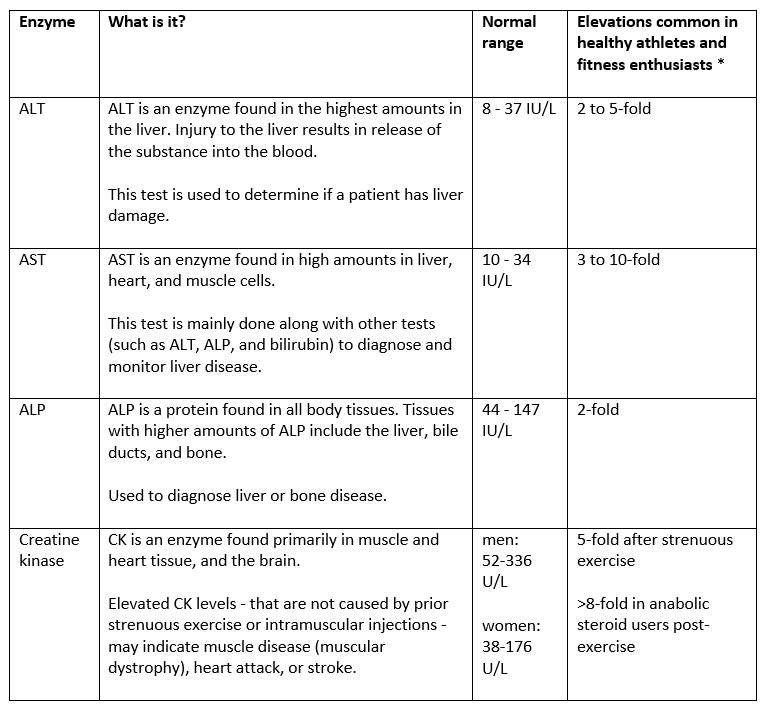yellow snow
New member
Thought this might help some that have questions on liver test. I am still trying to find the abstract that tried to prove that GGT is a better indicator of a failing liver due to anabolics than AST and ALT which have been shown to be elevated when poeple workout or do hard labor/activity.
[h=2]What are the commonly used liver function tests? [/h]Liver Enzyme Tests
Alanine Transaminase (ALT) is an enzyme mainly found in your liver. The ALT test measures the level of ALT in your blood. Consistently high levels of ALT in your blood can be a sign of liver damage.
Aspartate Transaminase (AST) is an enzyme found in large amounts in your liver and other parts of your body. The AST test measures the level of AST in your blood. High levels of AST can be a sign of liver damage.
Alkaline Phosphatase (ALP) is an enzyme found in large amounts in your liver, bile ducts, and other parts of your body. The ALP test measures the level of ALP in your blood. High levels of ALP can be a sign of liver or bile duct damage.
Gamma-glutamyl transpeptidase (GGT) is an enzyme found in large amounts in your liver, bile ducts, and pancreas. The GGT test measures the level of GGT in your blood. High levels of GGT can be a sign of liver or bile duct damage.
Liver Protein Tests
Total Protein measures the amount of protein in your blood. The two main proteins found in the blood are globulins and albumin.
Globulin is a protein made in your liver and helps the immune system fight infections. Low globulin levels can be a sign of liver damage or other conditions.
Albumin is another protein made in your liver. An albumin test measures how well your liver is making the proteins that your body needs. Low albumin levels can be a sign of liver damage.
Prothrombin is a protein made in your liver and helps with clotting blood. A prothrombin time test measures how much time it takes for your blood to clot. A high prothrombin time can be a sign of liver damage.
Bilirubin Tests
Bilirubin is a yellow fluid made in your body when red blood cells break down. A bilirubin test measures the level of bilirubin in your blood. If your liver is damaged, bilirubin can leak out of your liver into your blood and can cause jaundice (yellowing of skin and eyes). It also can come out in the urine making it look very dark.
[h=2]What are the commonly used liver function tests? [/h]Liver Enzyme Tests
Alanine Transaminase (ALT) is an enzyme mainly found in your liver. The ALT test measures the level of ALT in your blood. Consistently high levels of ALT in your blood can be a sign of liver damage.
Aspartate Transaminase (AST) is an enzyme found in large amounts in your liver and other parts of your body. The AST test measures the level of AST in your blood. High levels of AST can be a sign of liver damage.
Alkaline Phosphatase (ALP) is an enzyme found in large amounts in your liver, bile ducts, and other parts of your body. The ALP test measures the level of ALP in your blood. High levels of ALP can be a sign of liver or bile duct damage.
Gamma-glutamyl transpeptidase (GGT) is an enzyme found in large amounts in your liver, bile ducts, and pancreas. The GGT test measures the level of GGT in your blood. High levels of GGT can be a sign of liver or bile duct damage.
Liver Protein Tests
Total Protein measures the amount of protein in your blood. The two main proteins found in the blood are globulins and albumin.
Globulin is a protein made in your liver and helps the immune system fight infections. Low globulin levels can be a sign of liver damage or other conditions.
Albumin is another protein made in your liver. An albumin test measures how well your liver is making the proteins that your body needs. Low albumin levels can be a sign of liver damage.
Prothrombin is a protein made in your liver and helps with clotting blood. A prothrombin time test measures how much time it takes for your blood to clot. A high prothrombin time can be a sign of liver damage.
Bilirubin Tests
Bilirubin is a yellow fluid made in your body when red blood cells break down. A bilirubin test measures the level of bilirubin in your blood. If your liver is damaged, bilirubin can leak out of your liver into your blood and can cause jaundice (yellowing of skin and eyes). It also can come out in the urine making it look very dark.


